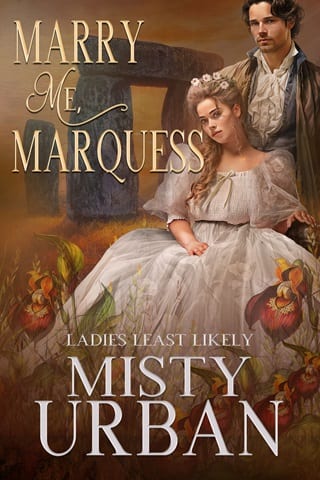Chapter 16
CHAPTER SIXTEEN
“ I made the pudding,” Hester announced, sliding into her chair at the long oak table occupying the old dining hall of Chapel Manor.
“Why, then I am sure to enjoy it.” Reverend Woodfforde, standing behind his own carved wooden chair in deference to the ladies, winked at her. “I’m inclined to believe I would be impressed by anything from Mrs. Caesar’s hands, but now I am doubly certain that pleasure awaits us.”
Hester regarded him seriously, as if looking for the slant behind his words. Very often she sensed when others were mocking her, even if she didn’t grasp the full import of the insult. But the reverend beamed at her in an avuncular fashion, and Temperance radiated her light over them all. Hester nodded, deciding to accept his remark as a compliment.
“Thank you. I hope you will not be disappointed. The recipe is quite simple, and Paulina helped, but apples are not in season, you know, and will not be for another month or more.”
Leo’s voice approached the dining chamber, and awareness rippled along Lillian’s shoulders like a scarf drawn along her skin. The back of her neck heated. She was a maiden sitting in a medieval keep watching for her favorite knight, knowing she must share him with everyone else, when what she wished was for them to be alone.
She liked that version of the world, they two alone. She liked when she was the only thing his eyes lit upon, where his attention focused.
She liked it too much, she was coming to see.
She’d chosen the loveliest of her packed gowns, a simple round gown with puffed sleeves. The striped silk, sprigged with pale yellow flowers, shone a golden brown, a shade darker than her hair. With Faustina’s aid she’d rolled her hair into a few coils pinned up and decorated with a clutch of lesser spearwort she’d found growing along the watercress bed. She regretted the simplicity of her attire when Leo strode into the room. She, Lillian Gower, who had never in her life dressed for the regard of a man, wanted the admiration of Leo Westrop.
He didn’t glance at her, his head turned toward Claudius as he continued their conversation. “—anything yet, as I told him, and it won’t speed our progress to have him ever poking in.” Leo nodded at the reverend by way of greeting.
“Is there something the matter?” the reverend asked.
Lillian could not decide if the man was excessively cordial, or if a deeper motive lay behind his curiosity. He’d accepted Paulina’s invitation to dine at once, which meant he was not otherwise engaged, which might mean there was simply a dearth of company to be found in Ashbury.
Or he was eager to get his sister inside the Manor, under the eye of the presumed heir to the Marquess of Waringford’s titles and fortunes. His lovely sister, slender and shining like a sunny stem of toadflax. Lillian was a squat, round field mushroom beside her.
“It’s Craven’s steward, Peaty.” Leo circled the table to seat Temperance while Claudius went to his wife. “He’s been accommodating on other matters. Let us rent this pile, in fact, since he’s in between tenants.”
Temperance beamed at him and slipped into her seat like a butterfly folding its wings and alighting on a flower. Her hair had received careful attention, a puff of curls covered with a silken net dotted with pearls. The bodice of her dress was a demure V, and the shoulder puffs of her sleeves covered her upper arm, but there was no veiling her beauty. She smiled over her shoulder at him and Leo paused, staring. Lillian’s throat ached.
“I wondered how you’d got this place,” the reverend remarked, taking his seat. “Peaty’s a good man. Exacting but thorough. Much admired by all who do business with him. But I’d expect no less from a man of Lord Craven’s.”
“He may be an exemplary steward, but he’s not an antiquarian.” Leo came to the foot of the table where Lillian stood, the only woman not yet seated. She had been taking the hostess’s place out of habit but realized now what that would signal. The place she was trying to claim in Leo’s life.
“Peaty thinks I should be hauling treasure out of the earth already, and if I’m not, I must be keeping something from him. Told me he’d be pleased to stop by and observe our operations any time it is convenient to me. How do I tell him no time is convenient?”
He’d related the steward’s letter to Lillian yesterday while inspecting his mound for further places to dig. She’d been his partner then, his equal and sounding board as they discussed whether to bore down from above or come through the side. He’d talked to her the way her father tested ideas on her mother. She understood his eagerness to make progress, his frustration over any delays.
She was coming to understand much about him. His disposition, his tendencies, his preferences, his dislikes. She could predict his response to so many things.
How could she be so attuned to him, yet he did not seek her out when he entered a room? He didn’t catch her eye or smile as she sat, though he’d stood struck by Temperance Woodfforde’s aura of brilliance. When his hand grazed Lillian’s arm, below her sleeve but above her glove, he jerked as if her skin had burned him.
A hot lump formed in her throat, as if she’d eaten a tart fresh from the oven.
“I would be happy to give Mr. Peaty a tour, Westrop,” she said, her voice tight. “You’ve told me about your approach and your methods. I am sure I could accurately represent your work. Unless, of course, Mr. Caesar would prefer to apprise Mr. Peaty of your progress. Or if Peaty is the type to doubt the word of a woman.”
Leo met her gaze, finally, and the tight line of his jaw softened, his mouth curving up.
“Any man would be a fool to doubt your capabilities, Miss Gower.”
She flushed and pressed her shoulders against the back of her chair so she didn’t lean toward him like some widgeon. It alarmed her, how much she craved his notice. His approval.
“Lord Craven must approve of you, Mr. Westrop, to give you the liberty of Chapel Manor,” the reverend said. “This is a jewel of the area, you know. Been here for three hundred years, built shortly after the War of the Roses to please the Abbot of Glastonbury and lodge their monks traveling to and from Oxford. I imagine many a philosophical conversation taking place in this hall, and many a prayer uttered in the oratory over the porch.”
The Chapel Manor, like Gower House, was of Tudor design, which was why Lillian supposed she felt comfortable here. A carved wooden screen partitioned the dining area from the formal parlor, but the chambers shared an elaborate vaulted ceiling, the heavy oak beams carved where they crossed with vines flowering into a Tudor rose. The transom windows, capped with a cinquefoil design, added to the air of age and stateliness.
Octavia and Hester sat straighter in their chairs, as if attuned to the grandeur. Only Leo looked immune, and Lillian wondered if that were because he had been reared in environs of greater luxury and historical pedigree, Waringford House in Sevenhampton, Westrop House in London, and no doubt half a dozen houses equally grand scattered over the marquessate.
“Certainly the monks never enjoyed such fine service.” Temperance smiled at Augustus, who was playing butler that evening and supervising the twins in their matching footman’s livery. Faustina was stationed in the kitchen, at the far side of the house, with instructions from her mother about which dishes to send in when, and within shouting distance should the need arise. Lillian didn’t know where Paulina had fetched up the fine porcelain service or crisp white cloth for the table, but she suspected the resourceful landlady of the Rose and Crown might have had a hand in their accommodations.
“I am not certain Craven has any opinion of me.” Leo sat back as Augustus placed the roast mutton before him for carving. “But he has a great fondness for Miss Gower, whom he considers a childhood friend. He offered the Manor at once when I wrote Mr. Peaty that a genteel lady would be joining my crew.”
He winked at her, and Lillian’s stomach closed like a night-blooming flower at dawn. If only she could be to him what that gesture portended, his partner. His companion. The one who knew his inmost feelings, who shared his quest.
She was sitting here tonight. She could pretend, if she wanted to.
“Tell us about yourself, Miss Gower,” Temperance said. There was nothing besides wide-eyed innocence in her expression, but Lillian, like Hester, had been pricked too often by the sweetly poisoned barbs of the London haut ton not to be wary.
“Lillian is a fine artist,” Leo said. “She’s publishing a florilegium with a very respected printer in London, Karim and Son. We spent a week with her parents, who are excavating at Stonehenge, to train me up before we removed here. Lillian came to draw for me so I may have a proper record of our dig.”
He could say all the pretty words, Lillian thought. So why could he not bear to touch her?
Temperance continued her sunny beam. “How accomplished you are, Miss Gower. I quite admire women of skill.”
“Now, Temperance, my dove, do not rate yourself less simply because you have not published books,” her brother admonished her. “To each his talent, as the Lord apportions, eh? Miss Hester, what is your talent, if I might ask?”
Lillian opened her mouth to tell him he might address Hester as Miss Giles, and to jump in if her cousin shied from the question. But to her astonishment, Hex, who normally disliked and ignored conversation with strangers, looked up with a serious air.
“I would say my talent is eating,” she said. “And Mrs. Caesar’s is preparing food, and Octavia’s setting a beautiful table, so I think we make quite a happy trio.”
The reverend laughed with more vigor than Lillian thought this observation deserved, but the others joined in, and even Leo seemed to lose some tension from his shoulders. The conversation grew merry after that. The reverend told lively stories of his former parishioners at St. Swithun’s over in Compton Beauchamp. Augustus broke into the conversation to ask about the sarsen stones scattered around the churchyard of St. Mary’s the Virgin, Ashbury’s church, and far from reprimanding the boy for speaking out of turn, Woodfforde told him the common opinion was that the site had been holy well before the conquering Normans built their churches—perhaps even before the Romans brought their roads and their swords and the coins that farmers kept finding in the fields around Ashdown.
Lillian thought the reverend young to be retired from his calling, though he was a decade or two older than his sister, who could not be much older than Lillian herself. He was the most genial guest, describing to Claudius and Leo what little was known about the earthworks called Uffington Castle and, less than a mile away, Hardwell Castle as well. He drank with the men at a measured pace, but he didn’t ignore the women. He made certain his sister sampled all the dishes, including the watercress salad and buttered asparagus; he praised Paulina extravagantly for her cooking and her beautiful children; and he drew out Octavia with questions about the local sights she had enjoyed so far, which she confessed to be the Manor’s dovecote, complete with nesting doves.
He even spared kind words and avuncular winks to Titus and Tiberius, teasing them about the imperial namesakes, and gave Augustus a word of advice about how to spoon out the ramson soup without spilling a drop. He could not, Lillian thought, be so entirely kind; there must be some purpose to his concerted efforts to be conciliatory. Then she chided herself for her surly thoughts. Perhaps the Woodffordes simply were the most pleasant pair of siblings she could imagine existing, and Lillian was being churlish because she did not want Leo’s appreciative gaze lingering on Temperance.
The reverend directed his kindliest smiles at Hester, to whom he turned with compliments as the Marlborough pudding passed round the table. “And I suppose, Miss Hester, that Mr. Westrop has already regaled you with the history of Wayland Smith, and how he came to inhabit this precise cave in Berkshire?”
Hester, savoring her pudding, sent an accusing look at Leo. “He has not, ” she declared.
“In my defense, the stories I hear keep changing.” Leo wasn’t willing to relinquish his status as Hester’s new favorite, and particularly not to this newcomer. “Though perhaps the vicar here has a better grasp of the myth.”
“Vicar no longer, I’m afraid, though I do find it difficult to put away the clerical collar, and even more difficult to put away my interest in pastoral care.” Woodfforde winked at Hester before turning to Lillian. “The story is a bit distasteful at times—you know those Northmen were not genteel folk. But I assure you, Miss Gower, I shall not shock delicate sensibilities too badly.”
Lillian could only nod, her throat filled with a thick, warm stew. The reverend’s deference to her as their hostess, the lady of Leo’s house, made her all too aware how much she longed for that distinction. How deeply she wished to be worthy of it.
She’d never had a table of her own to preside over, nor seen fare she’d helped prepare be so enjoyed, never entertained such a charmed circle of guests. It was very, very seductive. She wanted more of this.
“Mrs. Caesar or I will intervene if we find the story becomes questionable.” Lillian hoped she sounded composed yet authoritative. Paulina instructed the boys to take away the covers and lay the table with sweets and cheeses. Leo leaned back in his chair, eyes shadowed, face studious, as the reverend turned to Hester with his tale.
“Wayland, as the Saxons called him, or Volund to the Old Norse, was a smith of prodigious skill. He could craft the most delicate jewelry to flatter a lady and hammer weapons of such strength they would never bend. The King of Sweden tried to woo Wayland with promises of money, but Wayland refused. He lived happily with his wife, the Swan Princess, in the far reaches of the north, where the ice made sculptures that inspired his craftsmanship.”
The reverend’s deep, warm voice wove a spell, and Lillian could see how he belonged in a pulpit. “The King of Sweden sent men to seize Wayland and kidnap his wife to force the smith to work for him. When the cunning Wayland built a weapon that could break him out of the king’s prison and allow him to rescue his wife, the king ordered that Wayland be crippled, the tendons in his legs cut, so that he could not leave the king’s service.”
“What did Wayland do?” Hester eyes wide, took a sweet from the dish Woodfforde passed her. The good reverend had already apprehended that the way to Hester’s heart was stories and sweets, and he clearly meant to use this to his advantage.
“Wayland worked and plotted. Then one day, the king’s beautiful daughter came to Wayland seeking his talents. The princess was in love with the smith, you see, crippled and bitter though he was. She wanted him to set gems in a necklace her father had given her. She hoped with the project, Wayland would fall in love and marry her.
“She didn’t realize the necklace was one Wayland had made for his wife, the Swan Princess. The necklace was how he wooed and won her, and the king stole this token of their love to give to his daughter. When Wayland learned that his wife had been commanded to marry another man, he did something truly wicked.”
“We heard he killed the king’s sons and gave the king jeweled goblets made out of their skulls.” Titus, one of the twins, leaned his elbows on the back of his mother’s chair. All three of the boys listened as raptly as the diners. Paulina pulled her son’s ear to chide him for his ragged manners, and he straightened his back but didn’t move away.
“I was going to leave out that bit, as I believe that is stolen straight from the ancient Greeks and the tale of Tantalus, who served his son to the gods in a stew,” the reverend replied. “The tale is most unpalatable fare for ladies.”
“I certainly would not wish to eat young boy, no matter how deliciously prepared,” Temperance said.
She delivered the line so innocently that Lillian missed the jest until the boys broke into whoops of laughter. So, Miss Woodfforde was clever as well as exquisitely beautiful. Lillian shot a glance at Leo, who smiled with amusement, twirling his wineglass with long fingers.
Jealousy sunk in its talons and yanked. She felt as hamstrung as poor Wayland, unable to escape the spell cast upon her. Forced to watch in paralyzed agony, like the king’s daughter, as the man she loved fought for and won another.
“What about the poor princess?” Hester demanded.
“Alas, she fared little better than her brothers. Wayland agreed to marry her, but he did not love her. He abandoned her and their growing babe, for you see, the project Wayland had been working on in secret all this time, the great wonder commanded by the king, was a pair of enormous metal wings. Wayland put them on and flew away, across the North Sea, and came to Berkshire. Here he built a new smith and, in mourning for his lost wife, told no one who he was. But travelers found his work was unsurpassed in quality, and to this day, if a rider on the Ridgeway leaves his?—”
“Horse and a groat on the rock, and takes a quiet walk, he will return to find his horse properly shod,” Augustus finished. “And every hundred years, the great white horse gallops off his hill and down to the cave so the smith can change his shoes. But is that all he can do? Shouldn’t there be all manner of jewels and weapons and precious metals piled in his cave, and he’s guarded them all this time?”
“Then Mr. Westrop will unearth them, I fancy, and hope he’s not disturbing some ancient curse,” Woodfforde said.
“What metal is it that let him fly?” Tiberius wanted to know.
“Iron, I’d wager,” Leo said. “The Vikings used that more than anything.”
Titus made a face. “Then there’s only iron in the barrow?”
His twin elbowed him in the side. “But what if we find the wings?”
Their expressions transformed at the exact same time, and Leo anticipated the demand. “You’ll be the first to try them, if your father approves.”
Claudius grinned and shook his head. “What makes you think you’ll be able to operate the wings? Wayland was a god to the Saxons.”
“Until the light of the true faith came to the island with Augustine,” the reverend put in. “Now we know Wayland could be naught but man. Not an elf, not a troll, not a wizard.”
“What became of the princess?” Octavia asked.
“She married a man who loved her properly and raised her son to become the next King of Sweden,” Lillian said.
“Or she became queen herself and ruled her people with wisdom and fairness for a good long age,” Temperance retorted.
Everyone stared at her, including the boys.
“I fancy that ending for her,” Paulina mused.
“Lively stories,” Leo said, rising, “but none of them true. Wayland was borrowed from the old Norse by the Saxons, who never built with stone, and neither did the Danes, not even to bury their King Bagsecg, whom King Alfred defeated in the Battle of Ashdown. I have staked my reputation on the cave being a tomb even older than even the Romans, and if I’m fortunate, I’ll find proof that will admit me into the Society of Antiquaries and help me equip expeditions far into the future. Reverend, Miss Woodfforde.” He bowed slightly. “Forgive me if I don’t stay to linger over port. I have to study my maps and plot our work for tomorrow.”
He turned to Lillian. “Miss Gower. Will you join me when you can?”
Lillian nodded, her heart leaping around her ears. Leo wanted her.
“I will come to your study.” No reason to appear eager. Or, before their friends and guests, too anxious.
“We also must be getting home,” the reverend said in his genial manner. “We must pen up my sister’s chickens for the night, and she will need to feed her little lamb.”
Hester perked up. “You have a sheep?”
“I have an adorable little lambkin, and you must come visit and meet him,” Temperance said with her unwearying smile. “I named him Puff.”
“Yes, do come call on us at Watercress Cottage,” said the reverend. “You will lighten our day. You and your lovely children as well, Mrs. Caesar.”
“Though we understand how busy you are. Six children! You have been so blessed.” Temperance held out her hand to Paulina, but the reverend turned away suddenly, and Lillian caught the pained expression that drew his face into bleak lines.
After waving their visitors off, with Augustus hitching the cart horse to their chaise, Lillian strapped a work apron over her gown and helped Octavia wash dishes in the scullery. Paulina dried and put away the porcelain service while the boys brushed out their borrowed livery, arguing over who had looked the finest and would end up serving in a great house. Lillian participated in the warm family chatter, so different from what she was accustomed to in the more somber Gower household, but the whole time her heart, like an untamed pony, tugged her toward the study at the back of the house, where an oil lamp spilled light through the doorway and Leo’s footsteps sounded on the wooden floor.
She must not let him see her feelings so baldly. This was still a business arrangement to him.
She was the one who wanted it to become something more.
“Ought we call on the Woodffordes, do you think?” Lillian washed the goblets, recalling the dainty curl of Temperance Woodfforde’s lips, the tips of her fingers on her glass. She was a delicate stem of lady’s tresses beside Lillian’s sturdy thistle. “They seem almost suspiciously eager to make friends of us.”
Paulina paused with a cloth in hand and raised her brows. “You find kindness suspect?”
The reverend hadn’t turned a hair at their unorthodox table arrangements, with their host’s betrothed sitting in the lady’s chair, his employees dining at table as his equals, and their serving staff participating in the conversation. Aunt Giles would have gone into fits at their shabby manners.
“He seems awfully interested in Hex.” Lillian tilted her head toward the back door leading to the yard, where Hester and Faustina had taken a lamp and gone out to gather eggs for the morning.
Paulina put a platter on its shelf. “We can pay a return call at the least. You must realize, Lillian, that someone may take an interest in Hester. What if she wishes to marry and have a home of her own?”
Lillian shook her head. “I don’t think she’s fit for it. She needs looking after.”
“And you’re the only one who can do it?” Paulina cast an amused smile over her shoulder. “You’ve made certain she needs you. But do you also need her?”
“I care for her welfare.” Lillian scrubbed at the pie plate, the clumps of congealed sugar.
“That’s clear. But what are you doing about yours?”
“I don’t know what you mean.”
“Mr. Westrop.”
That thickness rose in Lillian’s throat again, and a warmth everywhere else.
Paulina smiled at her daughter as she took a rinsed plate from her hands. “Claud tell you I made him wait and work two years, wooing me?”
“Two long, desperate years, when he lived on hope and your smile,” Lillian said.
Paulina rubbed a cloth over the serving plate, her face tender. “We needed to earn money to marry, like anyone. I’d have said yes that first night if I could. I knew, the way he looked at me—my heart was safe with that man.”
Lillian swallowed hard. “Leo—Westrop doesn’t look at me that way.”
“You just don’t see it. My word, you’re worse than a cat on hot bricks. Go see what he wants.”
“To discuss the excavation.” Lillian untied her apron.
“Mmm-hmm. And he want more than that, you make him work to win you.” Paulina hung the apron on its peg as Lillian melted through the door.
What more could Leo want from her? This was all she did, Lillian thought: offer her skills, her company, her quiet, uncomplaining support. Making herself available to another’s needs so that they would want and appreciate her.
She didn’t want to be merely useful to Leo. She wanted to be necessary.
She crossed the quiet, cavernous space of the great rooms toward the glow coming from Leo’s workroom, where he and Claudius often conferred. The elder Caesar was currently out in the stable yard with Augustus, putting the animals to bed, and Leo was alone.
She didn’t want him simply to look at her as he had before, as if she were a rare orchid he had discovered, and he meant to study every part until he knew her. Interest like that could so easily turn to someone else.
She wanted to be indispensable. Impossible to put aside. His partner, his helpmeet, his Paulina, the woman he built his life around.
They had made no promises. No vows to bind them. Only a false declaration to the world, and falsehood must out itself sometime.
She didn’t know when it had happened, but she wanted this to be real .
She slid her hands over her skirts and entered the room.
 Fullepub
Fullepub 



